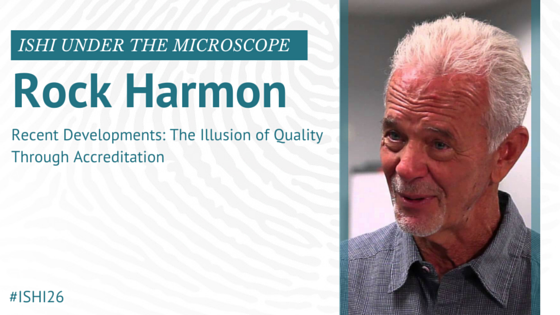The ISHI 26 agenda is already filling up with some great talks from amazing speakers! While the forensic community is a tight-knit group, we can always get a little closer, right? With that in mind, we asked our speakers some questions to get to know them a little better outside of their work. We’ll be posting their responses over the coming months in a feature we like to call Under the Microscope.
Today, we’re chatting with Rock Harmon, who will be presenting Recent Developments: The Illusion of Quality Through Accreditation during the General Sessions.
Rockne P. Harmon is currently employed as a consultant to numerous law enforcement agencies dealing with such issues as cold case investigation and other issues related to forensic DNA typing. He is currently an Instructor at U.C. Davis in the Masters in Forensic Science program. He retired in 2007 after a 33 year career as a Senior Deputy District Attorney for Alameda County, California.
He was the prosecutor in a triple murder case that established the general acceptance of conventional serological methods, the precursor to today’s DNA technology.( People v. Lawrence Reilly). As a result of that case he was in a position to assist the forensic science community as it began the implementation of DNA typing soon thereafter.
He has written and lectured extensively on the subject of the admissibility of forensic evidence, particularly DNA evidence. In 1998 he received an award from the FBI Director for his efforts supporting the FBI in their first decade of DNA typing. In 2003 he received the Achievement Award from the International Homicide Investigators’ Association for his work on cold cases.
How did you come to work in the field of forensics/DNA?
I was assigned a triple murder case in the early 80’s involving conventional serology as a critical part of the case. We had a nasty admissibility hearing, convicted the guy at trial. It became the legal precedent for serology admissibility and had impact around the US. As a result I was invited to speak at scientific meetings, usually the only prosecutor to do so. Soon the meetings turned to DNA, and there I was. I was an invited speaker at the seminal forensic DNA meeting at Cold Spring Harbor in 1987.
If you woke up tomorrow and this field no longer existed, what would you choose for a career?
I woke up, it is tomorrow, and I’m retired doing whatever I want to do each day. I’m still involved in forensic DNA issues to an extent, but not like I used to be.
What new technologies are you most excited about or where do you see the field heading in the next 10 years?
I wish I could say I’m excited about the prospects for familial DNA searching being implemented system-wide, but it seems like the resistance to it has won out. I wish I could say that someone will finally develop and introduce a cold hit tracking system to ensure that society is seeing the full benefit of the cold hits that occur, but that isn’t going to happen either. NGS promises to resolve some of the more challenging cases, so that is something to look forward to.
What was the most challenging or bizarre case that you’ve worked on?
The triple murder that got me started in the forensic serology field. The defendant murdered his friend, his friend’s wife, his friend’s sister over money proceeds from the victim’s LSD manufacturing business. He bled at the scene and later tried to commit suicide. See more here.
What person would you say has had the biggest influence in your life?
Clearly my parents. But I have had so many mentor/role models in every part of my life I couldn’t list them here.
Can you think of a specific example where ISHI has helped you in your career or with a case?
The opportunity to network and discuss issues that occurs at ISHI always provides the opportunity to improve. While the community has grown, people’s willingness to help each other has always been a part of the forensic community.
Who in the audience would benefit most from your talk?
Prosecutors, judges, defense attorneys, young forensic scientists, forensic community leaders, policy-makers.
If you won the lottery, what would you do with the winnings?
I’d spend more time in Hawaii with my friends and family, but otherwise I’d live the same.
If you were to have a theme song, what would it be?
Tower of Power, “You’re still a young man”
What would your ideal vacation be?
What I already do every Summer, 3 weeks on the beach in Hanalei, hanging with my family and friends there. Followed by 2 weeks in Paris. Friend me on Facebook to check it out.
WOULD YOU LIKE TO SEE MORE ARTICLES LIKE THIS? SUBSCRIBE TO THE ISHI BLOG BELOW!


